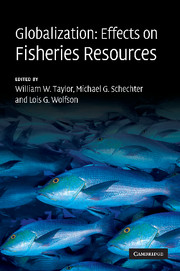Book contents
- Frontmatter
- Contents
- List of contributors
- About the editors
- Foreword
- Preface
- Acknowledgments
- Introduction: Globalization and fisheries: a necessarily interdisciplinary inquiry
- Part I Impacts of globalization on fisheries and aquatic habitats
- Part II Case studies of globalization and fisheries resources
- Part III Governance and multilevel management systems
- 13 Great Lakes fisheries as a bellwether of global governance
- 14 Ecosystem-based insights on northwest Atlantic fisheries in an age of globalization
- 15 “Fishy” food laws
- Part IV Ethical, economic, and policy implications
- Part V Conclusions and recommendations
- Index
- Plate section
- References
13 - Great Lakes fisheries as a bellwether of global governance
Published online by Cambridge University Press: 10 August 2009
- Frontmatter
- Contents
- List of contributors
- About the editors
- Foreword
- Preface
- Acknowledgments
- Introduction: Globalization and fisheries: a necessarily interdisciplinary inquiry
- Part I Impacts of globalization on fisheries and aquatic habitats
- Part II Case studies of globalization and fisheries resources
- Part III Governance and multilevel management systems
- 13 Great Lakes fisheries as a bellwether of global governance
- 14 Ecosystem-based insights on northwest Atlantic fisheries in an age of globalization
- 15 “Fishy” food laws
- Part IV Ethical, economic, and policy implications
- Part V Conclusions and recommendations
- Index
- Plate section
- References
Summary
INTRODUCTION
The purpose of this chapter is both straightforward and unique: to apply a global governance approach (Brühl and Rittberger 2001) to the study of Great Lakes (and particularly Michigan) fisheries. Case studies in global governance are rare; case studies focused in the United States are even rarer. Although students of international relations have done some work on fisheries (Peterson 1993) and international law scholars much more, little of that is recent enough to apply and contribute to the insights of the global governance literature. Moreover, an inquiry such as this one seems in keeping with Francis' notion of what is needed to garner further insights for “realistic applications of the ‘ecosystem approach’” to the Great Lakes:
More attention needs to be given to the study of these Great Lakes actor systems and to their “dynamics” over time. Such study could provide a common focal point for the diverse disciplines and specialties that comprise the social sciences and the humanities. The subject is well within their domain, in a way that the Great Lakes viewed only as hydrological–biological phenomena never was. (Francis 1987:235)
Thus this paper's purpose is to investigate “the processes and institutions, both formal and informal, that guide and restrain the collectivities of a group” (Keohane and Nye 2002) to begin to answer the question “of how the various institutions and processes of global society can be meshed more effectively in a way that would be regarded as legitimate by attentive publics controlling access to key resources” (Keohane 2002) (of the Great Lakes, in this instance).
- Type
- Chapter
- Information
- Globalization: Effects on Fisheries Resources , pp. 305 - 330Publisher: Cambridge University PressPrint publication year: 2007



